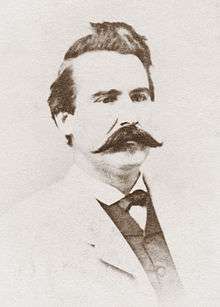Alexander W. Terrell
Alexander W. Terrell (November 23, 1827 – September 9, 1912) was an American judge, planter, Confederate veteran and diplomat. He served as the U. S. minister to Turkey and a Confederate military officer.
Alexander William Terrell | |
|---|---|
 | |
| Born | Alexander Watkins Terrell November 23, 1827 Patrick County, Virginia, U.S. |
| Died | September 9, 1912 (aged 84) Mineral Wells, Texas, U.S. |
| Resting place | Texas State Cemetery |
| Alma mater | University of Missouri |
| Occupation | Lawyer, planter, diplomat |
| Spouse(s) | Ann Elizabeth Boulding Sarah D. Mitchell |
| Children | 8 |
| Parent(s) | Christopher Joseph Terrell Susan Kennerly |
| Military career | |
| Allegiance | |
| Service/ | |
| Years of service | 1863–1865 |
| Unit | 1st Texas Cavalry Regiment 34th Texas Regiment |
| Battles/wars | American Civil War |
Early life
Alexander Watkins Terrell was born on November 23, 1827 in Patrick County, Virginia.[1][2] His father was Christopher Joseph Terrell and his mother, Susan Kennerly. His Quaker family moved to Boonville, Missouri in 1831.[1]
Terrell graduated from the University of Missouri and was admitted to the bar in 1849.[1]
Career
Terrell practiced law in St. Joseph, Missouri.[1] In 1852, he moved to Austin, Texas.[2][3] He served as a district court judge from 1857 until 1863.[1][3]
On July 4, 1861, Terrell gave a speech on the Texas State Capitol in defense of the Confederate States of America.[4] He drew a parallel between George Washington and the secession of the Confederacy.[4]
When his term as judge came to an end, Terrell joined the First Texas Cavalry Regiment of the Confederate States Army as major.[1][3] He fought in several major battles as part of the Red River Campaign including the Battle of Mansfield.[5] On May 16, 1865, Terrell was assigned to duty as a brigadier general by General E. Kirby Smith. He was never officially appointed by Confederate President Jefferson Davis and confirmed by the Confederate Senate to that grade. Davis had been captured by Union forces on May 10, 1865 and Smith soon would accept the Appomattox surrender terms agreed to by Lieutenant General Simon Bolivar Buckner on May 26, 1865, pending Smith's approval.[6]
Terrell chose to flee to Mexico after the war, and he briefly served Emperor Maximilian as a battalion commander. In 1866 he returned to Texas, where he practised the law in Houston. Subsequently, he spent time on his plantation in Robertson County, Texas.[1]
After Reconstruction, he served in both the Texas Senate and House of Representatives, serving sixteen years in the state legislature.[1] From 1893 until 1897, he was minister plenipotentiary to the Ottoman Empire during U.S. President Grover Cleveland's second administration.[1][2] From 1909 to 1911, he was a member of the University of Texas board of regents. He also served as the president of the Texas State Historical Association.
Personal life
Terrell married Ann Elizabeth Boulding. They had five children. After she died in 1860, he married Sarah D. Mitchell. They had three children.[1]
Death and legacy
Terrell died on September 9, 1912 in Mineral Wells, Texas.[2][3] He was buried at the Texas State Cemetery in Austin, Texas. Terrell County, Texas is named in his honor.[1]
Notes
- Nichols, Irby C., Jr. (June 15, 2010). "TERRELL, ALEXANDER WATKINS". Handbook of Texas Online. Texas State Historical Association. Retrieved December 28, 2015.
- "Judge A. W. Terrell Died Suddenly At Mineral Wells". The Houston Post. Houston, Texas. September 10, 1912. p. 1. Retrieved December 28, 2015 – via Newspapers.com.

- "Judge Terrell Dies At Mineral Wells. Was Author of Terrell Election Law and One Time Ambassador to Turkey". The Liberty Vindicator. Liberty, Texas. September 13, 1912. p. 4. Retrieved December 28, 2015 – via Newspapers.com.

- Lang, Andrew F. (July 2010). "Memory, the Texas Revolution, and Secession: The Birth of Confederate Nationalism in the Lone Star State". The Southwestern Historical Quarterly. 114 (1): 20–35. JSTOR 25745919.
- Winters, John D. The Civil War in Louisiana. Baton Rouge: Louisiana State University Press, 1963. ISBN 978-0-8071-0834-5. pp. 340-347
- Jamieson, Perry D. Spring 1865: The Closing Campaigns of the Civil War. Lincoln and London: University of Nebraska Press, 2015. ISBN 978-0-8032-2581-7. pp. 211-214.
References
- Lone Star Junction biography
- Allardice, Bruce S. Confederate Colonels: A Biographical Register. Columbia: University of Missouri Press, 2008. ISBN 978-0-8262-1809-4.
- Allardice, Bruce S. More Generals in Gray. Baton Rouge: Louisiana State University Press, 1995. ISBN 978-0-8071-3148-0.
- Eicher, John H., and David J. Eicher, Civil War High Commands. Stanford: Stanford University Press, 2001. ISBN 978-0-8047-3641-1.
- Jamieson, Perry D. Spring 1865: The Closing Campaigns of the Civil War. Lincoln and London: University of Nebraska Press, 2015. ISBN 978-0-8032-2581-7.
- Sifakis, Stewart. Who Was Who in the Civil War. New York: Facts On File, 1988. ISBN 978-0-8160-1055-4.
- Warner, Ezra J. Generals in Gray: Lives of the Confederate Commanders. Baton Rouge: Louisiana State University Press, 1959. ISBN 978-0-8071-0823-9.
- Winters, John D. The Civil War in Louisiana. Baton Rouge: Louisiana State University Press, 1963. ISBN 978-0-8071-0834-5.